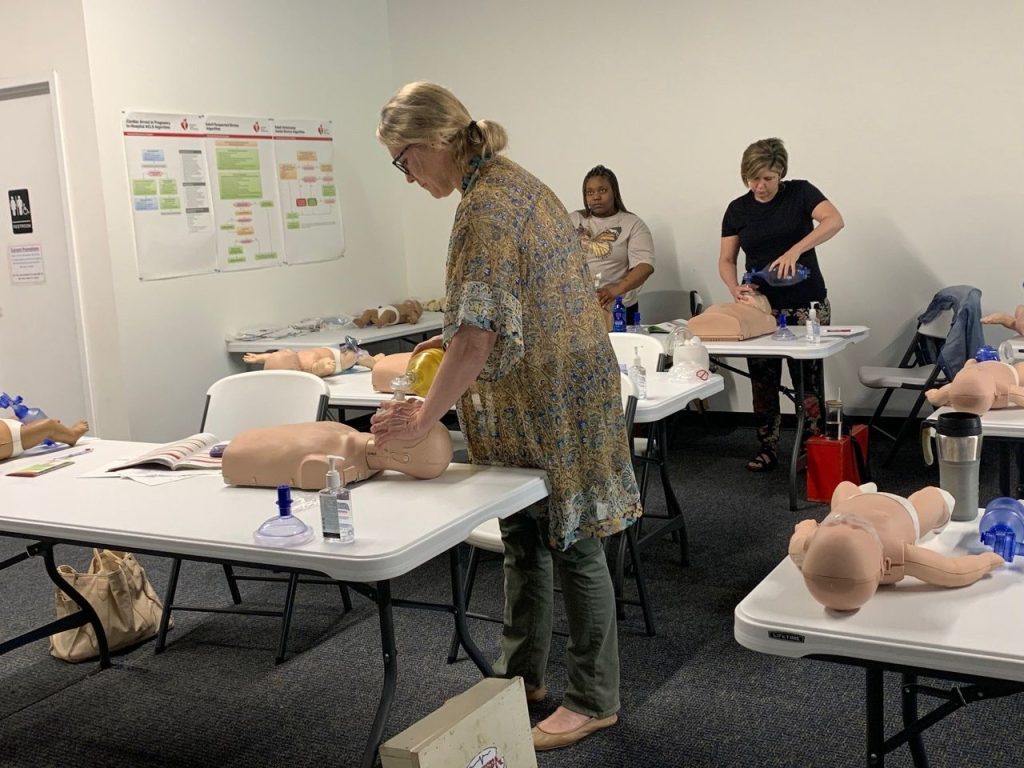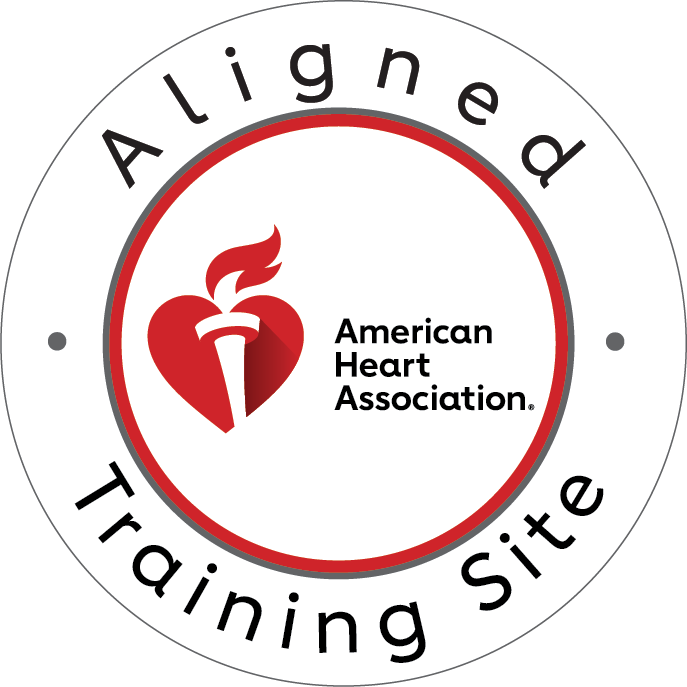I. Introduction
Cardiopulmonary Resuscitation (CPR) is a critical life-saving skill that can mean the difference between life and death in emergencies. The American Heart Association (AHA) provides comprehensive CPR training and certification, ensuring that individuals are equipped with the latest techniques and knowledge to respond effectively in cardiac emergencies.
However, like many certifications, AHA CPR certification requires regular renewal to ensure that practitioners maintain their skills and stay updated on the latest guidelines. As the world of education evolves, so too do the options for renewing these vital certifications. Today, individuals have two primary choices for AHA CPR renewal: online courses and traditional in-person classes.
Each option comes with its own set of advantages and disadvantages, which we’ll explore in depth to help you make an informed decision about which renewal method best suits your needs.
II. Online AHA CPR Renewal
The digital age has brought CPR renewal into the virtual realm, offering a new level of accessibility and convenience. Let’s examine the pros and cons of online AHA CPR renewal.
A. Pros
- Convenience and Flexibility: Online renewal allows you to complete your certification at your own pace and on your schedule. Whether you’re a night owl or an early bird, you can access the course materials whenever it’s most convenient for you. This flexibility is particularly beneficial for those with irregular work hours or busy schedules.
- Cost-effectiveness: Online courses often come at a lower price point than their in-person counterparts. You’ll save not only on the course fee itself but also on associated costs such as travel expenses and potential time off work.
- Self-paced Learning: Everyone learns differently, and online renewal courses allow you to progress through the material at a speed that suits your learning style. You can revisit challenging concepts as many times as needed without feeling rushed or holding up a class.
- Accessibility for Remote Areas: For those living in rural or remote areas, online renewal eliminates the need to travel long distances to attend in-person classes. This increased accessibility ensures that individuals in all locations can maintain their CPR certification.
B. Cons
- Limited Hands-on Practice: Perhaps the most significant drawback of online renewal is the lack of physical, hands-on practice. While many online courses use videos and interactive simulations, they can’t fully replicate the experience of practicing CPR on a mannequin under the watchful eye of an instructor.
- Potential for Distractions: Learning from home or another personal environment can sometimes lead to distractions that wouldn’t be present in a classroom setting. This may impact the quality of learning and retention of important information.
- Less Interaction with Instructors: Online courses typically offer limited opportunities for real-time interaction with instructors. This can make it more challenging to ask questions or seek clarification on complex topics.
- May Not Be Suitable for All Learning Styles: Some individuals learn best through hands-on, interactive experiences. For these learners, the online format may not be as effective in reinforcing critical CPR skills and knowledge.
Online AHA CPR renewal offers a convenient and accessible option for many, but it’s essential to consider your learning style and specific needs when deciding if this method is right for you.
III. In-Person AHA CPR Renewal
While online options have gained popularity, traditional in-person CPR renewal classes continue to offer unique benefits. Let’s explore the advantages and disadvantages of this time-tested approach.
A. Pros
- Hands-on Practice with Immediate Feedback: One of the most significant advantages of in-person renewal is the opportunity for hands-on practice. Participants can perform CPR techniques on mannequins under the direct supervision of trained instructors. This allows for immediate correction of errors and reinforcement of proper techniques, which is crucial for developing muscle memory and confidence in life-saving skills.
- Direct Interaction with Instructors: In-person classes provide the opportunity to ask questions and receive answers in real time. Instructors can offer personalized attention, addressing individual concerns and clarifying complex concepts on the spot. This direct interaction can lead to a deeper understanding of the material.
- Opportunity for Group Learning and Scenarios: In-person classes often incorporate group activities and simulated emergency scenarios. These exercises allow participants to practice teamwork and communication skills, which are essential in real-life emergencies. Learning from peers and observing others can also reinforce key concepts.
- Immediate Clarification of Doubts: If you’re unsure about a particular aspect of CPR, in-person classes allow for immediate clarification. This can be especially beneficial for visual or kinesthetic learners who may struggle with online or text-based instructions.
B. Cons
- Fixed Schedules: Unlike online courses, in-person classes operate on fixed schedules. This lack of flexibility can be challenging for individuals with busy or unpredictable work schedules. It may require taking time off work or rearranging personal commitments to attend classes.
- Higher Costs: In-person renewal courses often come with higher price tags compared to online options. Additional costs may include travel expenses, parking fees, and potential lost wages if time off work is required. These factors can make in-person renewal less accessible for some individuals.
- Limited Availability in Some Areas: Depending on your location, in-person CPR renewal classes may not be readily available. This is particularly true for those in rural or remote areas, where classes might be infrequent or require significant travel.
- Potential Exposure to Illness: In light of recent global health concerns, some individuals may be wary of attending in-person classes due to the potential risk of exposure to illnesses. While many training centers have implemented safety measures, this remains a consideration for some participants.
In-person AHA CPR renewal offers the benefit of hands-on practice and direct instructor feedback, but it comes with scheduling constraints and potentially higher costs. The decision between online and in-person renewal often depends on individual circumstances and learning preferences.
IV. Factors to Consider When Choosing
When deciding between online and in-person AHA CPR renewal, several key factors should influence your decision. Consider the following aspects to determine which option best suits your needs:
A. Personal Learning Style
Reflect on how you learn most effectively. If you’re a hands-on learner who benefits from physical practice and immediate feedback, an in-person course might be more suitable. However, if you’re comfortable with self-directed learning and can effectively absorb information through videos and interactive online modules, an online course could be a good fit.
B. Time Constraints
Evaluate your schedule and time availability. If you have a flexible schedule or can easily carve out time for self-study, online renewal might be more convenient. On the other hand, if you prefer a structured learning environment and can commit to a specific class time, an in-person course could provide the discipline and focus you need.
C. Budget
Consider your financial situation. Online courses are often more budget-friendly, especially when factoring in additional costs associated with in-person classes such as travel and potential lost wages. However, if your employer covers the cost of renewal or if you value the benefits of in-person training enough to justify the extra expense, the higher cost might be worth it.
D. Local Regulations and Employer Requirements
Check your local regulations and employer requirements regarding CPR certification. Some employers or licensing bodies may require in-person training and may not accept online certifications. Ensure that the renewal method you choose will be recognized and accepted by all relevant parties.
E. Previous CPR Experience
Your level of experience with CPR can also influence your decision. If you’re renewing your certification for the first time or feel less confident in your skills, an in-person course might provide the reassurance and practice you need. However, if you’re experienced and primarily need a refresher on updated guidelines, an online course might suffice.
By carefully considering these factors, you can make an informed decision about which AHA CPR renewal method is most appropriate for your situation. Remember, the goal is to ensure you’re prepared to provide effective CPR in an emergency, regardless of how you maintain your certification.
IV. Factors to Consider When Choosing
When deciding between online and in-person AHA CPR renewal, several key factors should influence your decision. Consider the following aspects to determine which option best suits your needs:
A. Personal Learning Style
Reflect on how you learn most effectively. If you’re a hands-on learner who benefits from physical practice and immediate feedback, an in-person course might be more suitable. However, if you’re comfortable with self-directed learning and can effectively absorb information through videos and interactive online modules, an online course could be a good fit.
B. Time Constraints
Evaluate your schedule and time availability. If you have a flexible schedule or can easily carve out time for self-study, online renewal might be more convenient. On the other hand, if you prefer a structured learning environment and can commit to a specific class time, an in-person course could provide the discipline and focus you need.
C. Budget
Consider your financial situation. Online courses are often more budget-friendly, especially when factoring in additional costs associated with in-person classes such as travel and potential lost wages. However, if your employer covers the cost of renewal or if you value the benefits of in-person training enough to justify the extra expense, the higher cost might be worth it.
D. Local Regulations and Employer Requirements
Check your local regulations and employer requirements regarding CPR certification. Some employers or licensing bodies may require in-person training and may not accept online certifications. Ensure that the renewal method you choose will be recognized and accepted by all relevant parties.
E. Previous CPR Experience
Your level of experience with CPR can also influence your decision. If you’re renewing your certification for the first time or feel less confident in your skills, an in-person course might provide the reassurance and practice you need. However, if you’re experienced and primarily need a refresher on updated guidelines, an online course might suffice.
By carefully considering these factors, you can make an informed decision about which AHA CPR renewal method is most appropriate for your situation. Remember, the goal is to ensure you’re prepared to provide effective CPR in an emergency, regardless of how you maintain your certification.
V. Conclusion
The decision between online and in-person AHA CPR renewal is not a one-size-fits-all choice. Both options have their merits and drawbacks, and the best choice depends on your circumstances, learning style, and needs.
In conclusion, both online and in-person CPR renewal options have their merits and drawbacks. The choice ultimately depends on your circumstances, learning style, and schedule flexibility. However, regardless of the method you choose, maintaining your CPR certification is crucial for healthcare professionals and anyone interested in being prepared to save lives.
If you’re in the Columbus area, we encourage you to consider CPR renewal in Columbus with CPR Columbus. As an American Heart Association training site, CPR Columbus offers high-quality, stress-free, and hands-on renewal courses for various certifications, including BLS for Healthcare Providers, ACLS, PALS, and CPR and First Aid.
Don’t delay in updating your life-saving skills. Enroll in a CPR renewal course in Columbus today and ensure you’re ready to respond effectively in emergencies. With CPR Columbus, you’ll receive the best CPR training in Columbus, keeping your skills sharp and your certification current. Take action now to maintain your readiness to save lives – sign up for your CPR renewal course with CPR Columbus!





